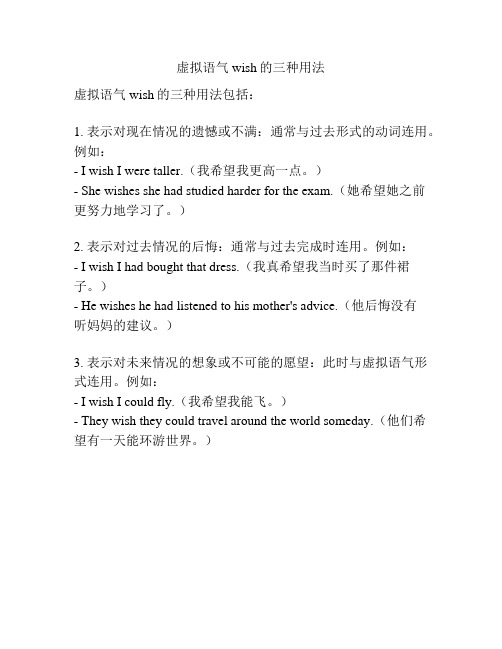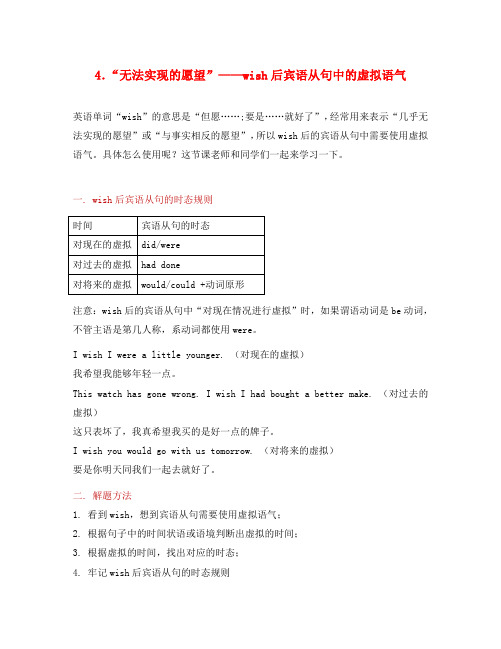I wish 后从句用虚拟语气
全国版高中英语wish后的宾语从句中虚拟语气的用法和习题(包含答案)

wish后的宾语从句中虚拟语气的用法和习题(含答案)概念:虚拟语气用在wish后的宾语从句中,(常常省去连词that),表示不可能实现的愿望。
1.表示与现在事实相反的愿望构成:主语+ wish (that) + 从句主语+ 动词过去式(be 一律用were)例如:I wish I knew everything in the world.I wish that the experiment (be)a success.(答案:were)We wish we (have)wings. (答案:had)Example:①I wish it ______ not so cold outside.A. shall beB. beC. wereD. is②I wish I ______ you better.A. knowB. knewC. will knowD. have known答案:①C ②B2.表示与过去事实相反的愿望构成:主语+ wish (that) + 从句主语+ would/could + have + 过去分词或had + 过去分词例如:I wish that you had called yesterday.I wish that I (go)with you last night.( 答案:could have gone/had gone)I didn't go to the party, but I do wish I (be)there.( 答案:had been)Example:①I wish you ______ such a great deal of fuss.A. were not causedB. had not causedC. have not causedD. are not caused②I wish that you ______ such a bad headache because I'm sure that you would have enjoyed the concert.A. hadn't hadB. hadn'tC. didn't haveD. hadn't have答案:①B ②D3.表示将来不大可能实现的愿望构成:主语+ wish (that) + 从句主语+ would/should/could/might + 原形动词例如:I wish that he could try again.I wish that someday I (live)on the moon.( 答案:should live)We wish that they (come)soon.( 答案:would come)Example:①I wish that we ______ with my brother when he flies to England next week.A. wentB. had goneC. are going②How he wishes he ______see his parents often in the future.A. would be able toB. was able toC.is able to答案:①B ②AEXERCISE1. I wish you ______ like that.a. don't talkb. wouldn't talkc. won't talkd. not to talk2. I wish I _____ how to operate the machine.a. have knownb. knowc. can knowd. knew3. He is not a millionaire but he _____ he were.a. wishesb. hopesc. longsd. believes4. I wish that I ______ visit my uncle the day after tomorrow.a. shallb. havec. wouldd. am going to5. I wish it ______ spring all the year round.a. will beb. werec. bed. is6. I wish I _____ to that university with you yesterday.a. would gob. wentc. did god. had gone7.I left very early last night, but I wish I ______ so early.a. didn't leaveb. hadn't leftc. haven't leftd. couldn't leave8.Nancy sometimes wishes that she ______ in the big city.a. was not livingb. did not livedc. were not livingd. does not live9.James wishes he ______ the football game instead of the film.a. had seenb. sawc. had been seend. see10. While you're here, I wish ______ have a look around the house.a. you'llb. you'vec. you'dd. you better11.Looking back on it, I wish you ______ me first.a. askedb. have askedc. askd. had asked12.“Do you want me to lend you some money?”“I wish you ______. I would pay you back next week.”a. shouldb. wouldc. didd. might13.I wished it ______ but it did.a. had not occurredb. would not occurc. was not occurredd. did not occur14.He didn't go to her birthday party, but he does wish he ______ there.a. has beenb. would bec. had beend. would have been15.“These typewritten papers are very neat.”“I wish I ______ type too, but I don't know how.”a. canb. mayc. willd. could答案:1~5 ddacb6~10 dbcac11~15 dbacd。
虚拟语气的八种情况

No.1虚拟语气的常见类型和句型(1)由wish引起的表示愿望的虚拟语气A.用wish表示对现在的愿望时,它所引起的宾语从句中谓语动词形式为:过去式(be动词用were)。
B.用wish表示对将来的愿望时,它所引起的宾语从句中谓语动词形式为:would, could, might+ 动词原形。
C.wish用于对过去的事实表示一种不可能实现的愿望时,宾语从句中的谓语动词形式为:had+动词过去分词或could, would + have +动词过去分词。
The picture exhibition bored me to death; I wish I had not gone to it.---“I let Joe borrow our radio for the afternoon.”---“That’s all right, but I wish he would buy one of his own.”I wish that he weren’t so lazy.(2)had hoped引起的宾语从句中备用语动词形式为would+动词原形,表示一种过去未实现的愿望或令人失望的事。
His father had hoped that his son would go to business with him, but his son became an artist later.(3)would (had) rather, would as soon, would sooner和would prefer所引起的从句中要求用过去式表示当时或将来的情况,用过去完成时表示过去的情况,表示希望或婉转的责备。
例如:I’d rather you posted the letter right away. 我倒希望你把这封信立刻寄出去。
I would prefer he didn’t stay there too long.我倒希望他不要在那儿可得太久。
高中英语虚拟语气用法小结

高中英语虚拟语气用法小结虚拟语气用法小结白杨林河南省社旗县第二高级中学虚拟语气表示说话人所说的事或话不是事实,而是一种假设,愿望,怀疑或推测。
它主要用于条件从句,让步从句和名词性从句中。
一、虚拟语气在条件句中的用法:虚拟语气常用在条件句中,表假设的情况与事实相反或不太可能实现,这种句子称为虚拟条件句。
可分为下列几种情况:1、假设的条件与现在的事实恰好相反,主从句的谓语动词应属:if主+动词过去式或were…,主+would/should/could/might+v、(原形)(主句中should通常只用作第1人称)。
例如:ifitwerenotforthesmowyweather,wewouldbeallright.例1、ifiyou,iwouldgowithhimtotheparty.a、wasb、werec、hadbeend、willbe析:该句为if鼓励的条件句,从主语谓语看看“wouldgo”(就是与现在事实恰好相反),套用上边句型,从句谓语应属动词过去式,若是be动词应属were,所以该题答案应属b。
2、假设的条件与过去事实相反,其句子结构应为:if+主+haddone…,主+would/could/should/might+havedone…基准2、morecareful,hisshipwouldnothavesunk.a、ifthecaptainwereb、hadthecaptainbeenc、shouldthecaptainbed、ifthecaptainwouldhavebeen析:该题题干部分有一谓语动词为wouldnothavesunk,由此可知是对过去事情的虚拟,便可推出从句的谓语动词应为haddone形式,再看选项,含用心爱心专心有haddone的只有b,该题正确答案即是b。
(当if引导的虚拟条件中有were,had,should时,可省略if,把were,had,should提到主语之前)。
虚拟语气wish的三种用法

虚拟语气wish的三种用法
虚拟语气wish的三种用法包括:
1. 表示对现在情况的遗憾或不满:通常与过去形式的动词连用。
例如:
- I wish I were taller.(我希望我更高一点。
)
- She wishes she had studied harder for the exam.(她希望她之前
更努力地学习了。
)
2. 表示对过去情况的后悔:通常与过去完成时连用。
例如:
- I wish I had bought that dress.(我真希望我当时买了那件裙子。
)
- He wishes he had listened to his mother's advice.(他后悔没有
听妈妈的建议。
)
3. 表示对未来情况的想象或不可能的愿望:此时与虚拟语气形式连用。
例如:
- I wish I could fly.(我希望我能飞。
)
- They wish they could travel around the world someday.(他们希望有一天能环游世界。
)。
虚拟语气分三种情况来掌握

虚拟语气分三种情况来掌握:1、虚拟条件句。
2、名词性虚拟语气。
3、虚拟语气的其他用语。
一、虚拟条件句:条件状语从句是非真实情况,在这种情况下要用虚拟语气。
1、条件从句与现在事实不一致,其句型为:If 主语+过去时,主语+should(could, would,或might)+动词原形,如:If I were you, I wouldstudyhard.If it rained, I wouldnot be here now.2、条件从句与过去事实不一致,句型为:If 主语+had+过去分词,主语+should(could, would,或might)+have+过去分词,如:If the doctor had come last night, the boy wouldhave saved.If I had not studie d hard, I wouldhave failed in the exam last term.3、条件从句与将来事实不一致,句型为:+do,主语+should(could…)+原形do过去时(与现在事实条件句一样)。
If it should rain tomorr ow, we wouldstay at home.If I were to go to the moon one day, I couldsee it with my own eyes.If you missed the film to night, you wouldfeel sorry.注意问题:1、If条件句中绝对不可出现“would”。
2、根据句中的时间状语,有时可能出现“混合虚拟”的情况,即主句可能是现在的情况,条件句也许是发生在过去的情况,但都是遵守上述句型。
3、在条件句中如果出现we re, had, should可省去if,将主语与这些词倒装,例如:Had the doctor come last night, the boy wouldhave saved.Were I to go to the moon one day, I wouldsee it with my own eyes.Should it rain tomorr ow, we wouldstay at home.二、名词性虚拟语气:在表示命令、建议要求、惊叹时的名词性从句中需用虚拟语气,基本句型:主语+(should)+动词原形,如:Mother insist ed that John go to bed at 9 o’clock.(宾语从句)We sugges ted that the meetin g should not be held.It was requir ed that the cropsshould be harves ted at once.(主语从句)The sugges tionthat he be invite d was reject ed.(同位语从句)That is theirdemand that theirwagesbe increa sed.(表语从句)注意:在这种句子中绝不出现“would”“must”“could”等。
虚拟语气分三种情况来掌握

虚拟语气分三种情况来掌握:1、虚拟条件句。
2、名词性虚拟语气。
3、虚拟语气的其他用语。
一、虚拟条件句:条件状语从句是非真实情况,在这种情况下要用虚拟语气。
1、条件从句与现在事实不一致,其句型为:If 主语+过去时,主语+should(could, would, 或might)+动词原形,如:If I were you, I would study hard.If it rained, I would not be here now.2、条件从句与过去事实不一致,句型为:If 主语+had+过去分词,主语+should(could, would, 或might)+have+过去分词,如:If the doctor had come last night, the boy would have saved.If I had not studied hard, I would have failed in the exam last term.3、条件从句与将来事实不一致,句型为:+do,主语+should(could…)+原形do过去时(与现在事实条件句一样)。
If it should rain tomorrow, we would stay at home.If I were to go to the moon one day, I could see it with my own eyes.If you missed the film to night, you would feel sorry.注意问题:1、If条件句中绝对不可出现“would”。
2、根据句中的时间状语,有时可能出现“混合虚拟”的情况,即主句可能是现在的情况,条件句也许是发生在过去的情况,但都是遵守上述句型。
3、在条件句中如果出现were, had, should可省去if,将主语与这些词倒装,例如:Had the doctor come last night, the boy would have saved.Were I to go to the moon one day, I would see it with my own eyes.Should it rain tomorrow, we would stay at home.二、名词性虚拟语气:在表示命令、建议要求、惊叹时的名词性从句中需用虚拟语气,基本句型:主语+(should)+动词原形,如:Mother insisted that John go to bed at 9 o’clock.(宾语从句)We suggested that the meeting should not be held.It was required that the crops should be harvested at once.(主语从句)The suggestion that he be invited was rejected.(同位语从句)That is their demand that their wages be increased.(表语从句)注意:在这种句子中绝不出现“would”“must”“could”等。
虚拟语气的几种常见句式 Ex.

虚拟语气的几种常见句式1. wish后的宾语从句表示现在不能实现的愿望,从句的谓语用过去式;表示过去未能实现的愿望,从句的谓语用had + 过去分词;表示将来不太可能实现的愿望,从句的谓语用would + 动词原形。
如:I wish I knew the answer to the question.我真希望知道这个问题的答案。
(事实上不知道)I wish I had not wasted so much time.我真希望没有浪费这么多时间。
(事实是已经浪费了)I wish you would go with us tomorrow.但愿你明天跟我们一起去。
(你去的可能性不大)2. as if 或as though引导的表语从句和状语从句表示与现在事实相反,从句的谓语用过去式;表示与过去事实相反,用had +过去分词;表示与将来事实可能相反,用would + 动词原形。
如:She looks as if she were sick.她看起来像病了似的。
(其实没病)He looks as if nothing had happened to him.他看上去好像什么事都没发生似的。
(事实是出问题了)He talks about the book as if he had written it.他说起那本书来就好像是他写的。
(书不是他写的)如果as if / as though引导的从句所表述的内容与事实相符,应用陈述语气。
如:It looks as if our team is going to win.看来我们队要赢了。
(场上情况表明有可能)3. if only后的句子表示现在没有实现的愿望,动词用过去式;表示过去没有实现的愿望,动词用had+过去分词;表示与将来事实可能相反的假设,谓语动词使用would+动词原形,could+动词原形或虚拟语气过去时,常译为“要是……就好了”。
如:If only I could learn English well in one day.要是能在一天内把英语学好就好了。
高中英语 破题致胜微方法(虚拟语气2)4无法实现的愿望-wish后宾语从句中的虚拟语气

4.“无法实现的愿望”——wish后宾语从句中的虚拟语气英语单词“wish”的意思是“但愿……;要是……就好了”,经常用来表示“几乎无法实现的愿望”或“与事实相反的愿望”,所以wish后的宾语从句中需要使用虚拟语气。
具体怎么使用呢?这节课老师和同学们一起来学习一下。
一. wish后宾语从句的时态规则注意:wish后的宾语从句中“对现在情况进行虚拟”时,如果谓语动词是be动词,不管主语是第几人称,系动词都使用were。
I wish I were a little younger. (对现在的虚拟)我希望我能够年轻一点。
This watch has gone wrong. I wish I had bought a better make. (对过去的虚拟)这只表坏了,我真希望我买的是好一点的牌子。
I wish you would go with us tomorrow. (对将来的虚拟)要是你明天同我们一起去就好了。
二. 解题方法1. 看到wish,想到宾语从句需要使用虚拟语气;2. 根据句子中的时间状语或语境判断出虚拟的时间;3. 根据虚拟的时间,找出对应的时态;4. 牢记wish后宾语从句的时态规则三. 经典例题1. The picture exhibition bored me to death. I wish I__________to it.A. had not goneB. have not goneC. did not goD. can not have gone解析:本题考查wish后宾语从句的虚拟语气。
句意:这次的图片展真把我烦死了。
我真希望我没有去看。
由句意可知“我希望自己没有去看图片展”是与事实相反的,所以这里需要使用虚拟语气。
由前一句中动词“bored”的形式可知是对过去事实的虚拟,所以wish后的宾语从句中应该使用过去完成时had not gone。
答案:A2. How I wish every family__________a large house with a beautiful garden.A. hasB. hadC.will haveD.had had解析:本题考查wish后宾语从句的虚拟语气。
- 1、下载文档前请自行甄别文档内容的完整性,平台不提供额外的编辑、内容补充、找答案等附加服务。
- 2、"仅部分预览"的文档,不可在线预览部分如存在完整性等问题,可反馈申请退款(可完整预览的文档不适用该条件!)。
- 3、如文档侵犯您的权益,请联系客服反馈,我们会尽快为您处理(人工客服工作时间:9:00-18:30)。
I wish 后从句用虚拟语气的三种形式
请看下面一题:
I wish you __________ him my telephone number,but you did.
A.didn’t give
B.hadn’t given
C.wouldn’t give
D.shouldn’t give
此题应选B。
I wish后接宾语从句时,谓语有三种可能:
1.表示与现在事实相反的愿望,用过去时:
I wish I were a teacher. 我要是一位老师就好了。
I wish I remembered her address. 我要是记得她的地址就好了。
2.表示与过去事实相反的愿望,用过去完成时:
How I wish I had seen her off at the station,but I was too busy. 我要是去车站送过她就好了,但我太忙了。
3.表示与将来事实相反的愿望,用could/ would+/ might+动词原形:
I wish he would come at once. 我真希望他马上来。
类似地,以下结构也与wish情况类似(从句分三种情况):
(1) If only(但愿):用法与含义均与I wish相似,以上各例中的I wish均可用If only
代之,含义大致相同。
(2) as if/ though (好像):
She loves the child as if he were her own. 她疼爱这孩子,就像是她自己的孩子一样。
(与现在事实相反)
He talks as if he had been there many times. 他说起话来好像是去过那儿多次似的。
(与过去事实相反)
He speaks as if he would die soon. 听他说话那语气好像不久就要死似的。
(与将来事实相反)。
